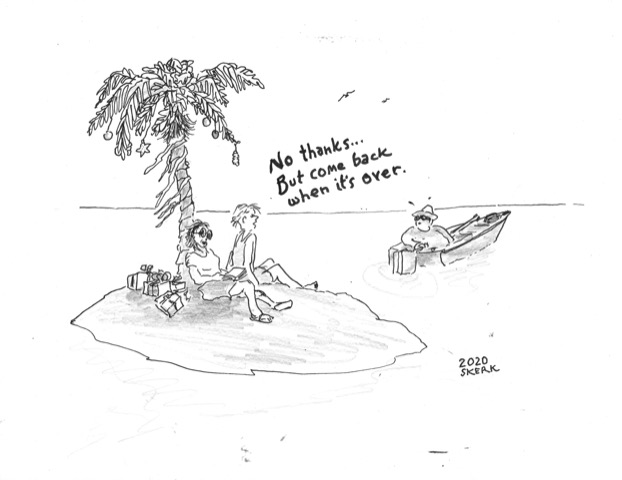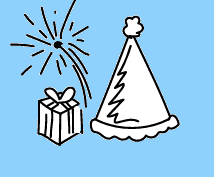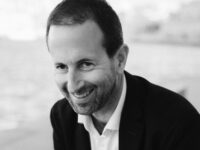2020 Mea Covid
Introduction
It’s 2025. I’m sitting in a waiting room, watching my doctor chatting with some patients about Covid 19. He sees me and says, in his strong Eastern European accent: ‘Peter is a journalist, he wrote a lot about the Pandemic.’ He smiles. ‘Do you think the vaccines worked?’
About fifteen sick people turned to me, as if expecting a magical, qualified answer. I have to say something: ‘It probably protected the vulnerable…people who really needed it…’ …but for everyone else, I don’t know.’
That was the mantra for those years: I don’t know. But what I do know is that despite five years in boarding school, and working in zoos and prisons in China, Peru and Madagascar, the Covid Pandemic was one of the strangest periods of my life.
I was lucky: I didn’t experience terrible loss. But I did share unusual experiences with my father, who drew cartoons as he isolated himself in Florida, and my son Charlie, who reported on adult behaviour during the crisis.

Agent Charlie
[Casefiles of a three-year-old investigator and his Native father, ‘Bristles’]
WAKE-UP CALL
Early this morning I come into the bedroom and say,
‘Daddy, I can’t smell.’
‘WHAT?!’
Bristles jumps out of bed as if electrocuted. He grabs a thermometer from The Crisis Cabinet and takes my temperature.
‘Do you have a fever/cough/headache?’ he rattles off, his eyes wide and wild.
I think about it.
‘What does ‘fever’ mean?’
‘Oh God,’ says Bristles. He puts my finger in an oximeter.
‘Daddy—’
‘Have you lost your sense of taste as well as your sense of smell?’ he says, hyperventilating.
‘Daddy—’
‘Are any of your friends infected?‘
‘Daddy, what’s a—’
‘You can’t smell.’ He takes my hands and stares deep into my eyes. ‘You can’t smell anything?’
I wipe my nose.
‘Boogers,’ I say.
‘What?’
‘Boogers.’ I hold up my fingers. ‘I can’t smell.’
He goes wild with joy.
‘You’ve got a blocked nose! It’s just a blocked nose!’
We dance around the tissues, thermometer, oximeter, plastic gloves, sanitisers and masks, celebrating my snot.
NATIVE TRADITIONS
Bristles enters the shop.
‘Good morning.’
‘MASK!’ screams the lady at the counter.
‘Oh—sorry.’
Bristles puts on his face protector.
‘Do you have any—’
‘SOAP!’ screams the lady.
This is truly the golden age of handwashing. Everyone is so clean! Bristles and I go to one, two, three, FOUR different shops, and soon my fingers are sweet with lavender, honeysuckle, violet and Dettol.
‘ONE METER!’
Bristles enjoys being shouted at in shops. Nothing can dent his happiness now that football has returned, and his team have become ‘Champions.’
‘We last won the League over eight Charlies ago,’ he tells me. To celebrate being ‘Champions’, Native fans stay home and wash their hands.
Hooray!
SUMMARY
So far, so good:
No one knows I’m in charge.
Mea Covid: A Father’s Perspective
For me, the pandemic truly began in February 2020, at the end of a trip to the Philippines, when I saw a newspaper headline at Manila airport:
IT’S HERE.
As I was leaving, Covid was arriving.
‘Jesus, dude,’ said my best friend, an English psychologist. ‘We’re actually living through a Pandemic. It’s nuts.’
He thought the human race was behaving like a bunch of monkeys, panicking about an unknown threat. His was an upbeat perspective, and I realised I had lived a charmed life, unaffected by global conflicts, but 2020 felt like a wartime situation.
England, and much of Europe, was far worse affected by infection rates and government policies, but there were still some strange stories from the island where I lived, in a hot corner of Europe.
Once I got back from Manila, the bars, gyms and restaurants soon closed. It was ‘illegal’ to eat or drink outside. My friends and I got hit-and-run take-outs from speakeasy pizzerias; we drank beer in wary groups, ever vigilant for the viral police. Otherwise, I was delivering food bags for a charity and spending two days a week taking care of my son.
Now that my work was suspended, I had a lot more time on my hands. I thought that Covid would keep everyone indoors, but to my surprise there was a vibrant dating scene.
Dates may seem frivolous during a Pandemic, but meeting someone new felt wrong and illicit yet emotionally necessary, as normal hugs and physical contact was shunned.
Meetings had to take place in cafés, bars and restaurants. I tried to mix things up by inviting J, a red-haired biology teacher, for a sunset horse-ride, but she was too busy at work, teaching through a mask, to kids behind shields.
So we went to a Greek restaurant in a bay. That evening, fishing boats groaned on the tide, ducks quacked in an inlet and local families sat with their dogs, smoking and talking loudly.
The blue and white taverna was a new place, and I wished it was run by a Greek people. The staff was mostly local and I only had to ask the waitress three times to turn down the terrible music.
Everyone passing by was wearing a mask. Only by sitting in a restaurant, talking on your phone, jogging or smoking could you avoid having to wear one.
“Masks are the new condoms”, I told J. “Discuss.”
She smiled and ran a pale finger around her glass.
“Do you think they’re effective?” I asked.
“Of course.’
‘Why?’
J tried to explain to me about viral lodes, and the difference between bacteria, viruses and prions; there are lots of differences, but my only takeaway was “bacteria are bigger”.
I was drawn to J by her knowledge, and I liked the way her hair seemed to glow like the embers of a fire. She was passionate about sanitizing stuff, cleaning the knives and forks on our table, rubbing down the plates.
“Of course masks are effective,” she said.
“But outside? That’s the one thing we know: the virus is much harder to spread outdoors.”
She drank some wine.
“True.”
“I remember another disease”, I said. “My brother had just hit 17, and he came storming into my room, pointing at a cover of Time, with its big gravestone saying, ‘AIDS’.”
There was a yelp, followed by frenzied quacking: a big white duck was bullying a Chihuahua, while its owners were watching on and laughing.
“My brother was furious”, I went on. “He was saying, ‘This can’t happen, these are my fun years!’
‘That’s not the same at all,’ said J, but she looked amused.
At the end of the meal the waitress, a nice Nepalese girl, told us we couldn’t pay by credit card. I was fine pulling out cash, but J told the waitress, “You should have told us that at the beginning of the meal.”
The waitress looked tired. To be honest, it wasn’t her fault. As I understood it, new restaurants couldn’t be granted full access to banks until the government had ensured they weren’t laundering money for the local mafia.
Instead of saying, “Sorry, I’ll tell my boss about your issues”, the waitress gave off a stream of excuses. When her English ran out she shrugged and concluded, “We don’t have machine. Covid.”
We paid in cash, and J said, “Blame it on Covid, as usual.”
‘Mea Covid,’ I said.
She frowned. ‘Instead of ‘Mea Culpa?’
‘That’s right.’
‘Mea Covid’ just means ‘My Covid.’’
‘Yeah, but it sounds good.’
It occurred to me that “Covid” is the perfect excuse, a single phrase to justify anything going wrong. The electricity’s gone: blame Covid. We haven’t fixed the potholes, because of ‘the virus.’ With Covid, no one has to take responsibility for anything.
As we got up I realised we were quite drunk, but we remembered to put on our masks. We walked along the harbour, past blue fishing boats with painted Egyptian eyes, past darkened docks and abandoned warehouses.
We stopped between two ships on dry dock. I took J’s hand and she turned to me. We pulled down our masks and kissed in the warm darkness. It was intense, thrilling, forbidden.
By the time we saw each other again, a week or so later, the Island had lifted the lockdown and almost all restrictions on social interaction. Perhaps that’s why J and I couldn’t rekindle that kiss. We’d been spoiled by the illicit thrill of removing our masks in public, a viral nakedness.
Agent Charlie
[Casefiles of a three-year-old investigator and his Native father, ‘Bristles’]
SOCIAL DISTANCING
Normally Bristles takes me to a park, but today we find a Native vendor exchanging fruit and vegetables for pieces of paper. There are three Natives waiting behind a plastic line.
We stand at quite a distance from the other Natives, two of whom have covered their mouths. Is it to stop them biting other Natives? And why are we standing so far apart? Have the Natives weaponized hugs?
Someone coughs.
The vendor jumps behind a row of cabbages. The Natives run off in different directions, Bristles takes my hand. We re-cross the road without even looking for a left or right, and when we arrive back home and sit down to take off our shoes, he’s looking more upset than ever.
He sings a song and washes his hands.
‘Yewow Submarin!’ I say.
He sings the song again and washes my hands, then sits me in his lap.
‘Charlie— I have to tell you something.’
His voice is low and grave.
‘I want you to listen carefully. I don’t want to scare you, but this is important—something bad is happening, something very bad, and we have to be ready for it.’
He bows his head.
‘This has never happened before, never in my lifetime, and I just hope and pray it doesn’t affect us too much.’
He looks close to tears.
‘What’s wrong, Daddy?’ I say.
His head drops. He takes a deep breath.
‘They’ve suspended football. All football—everywhere.’
‘Supended!’
He grabs me by the shoulders.
‘Six weeks, Charlie. SIX WHOLE WEEKS without football! Minimum!’
Now he’s sobbing.
‘I thought I could be tough, I thought I could take the uncertainty… the worrying, the stress…’
His voice fades to a whisper. He looks me deep in the eyes, and now his voice is determined.
‘We have to be strong, Charlie. Can you be strong for me?’
‘Daddy,’ I say. ‘What’s a ‘minimum’?’
He gives an anguished wail and takes me in his arms.
HOMESCHOOLING
I hold up a card.
‘Triceratops,’ says Bristles.
‘Yeth,’ I say.
His turn to hold one up.
‘How about this one? Bet you can’t guess this one.’
‘Thauropod.’
Bristles looks blank. This will never work.
NEW YEAR
The Natives have decided that everything will change, so they blow up balloons and drink a special wine full of stars. Then they count down:
‘…TEN, NINE, EIGHT… ‘
I look around, wondering what’s going to change. Will I get a later bed-time?
‘…SEVEN, SIX, FIVE, FOUR…’
I feel a burst of hope. Will the dinosaurs return?
‘THREE, TWO, ONE—’
Will I finally go to Jupiter?
‘HAPPY NEW YEAR!’
Everyone jumps up and down and shouts and drinks and hugs and kisses. Everyone is happy.
I look around.
‘But Daddy,’ I say. ‘Everything’s still the same.’
‘I hope not,’ says Bristles, grimly.
SUMMARY
So far, so good:
No one knows I’m in charge.

ENDS 2020
